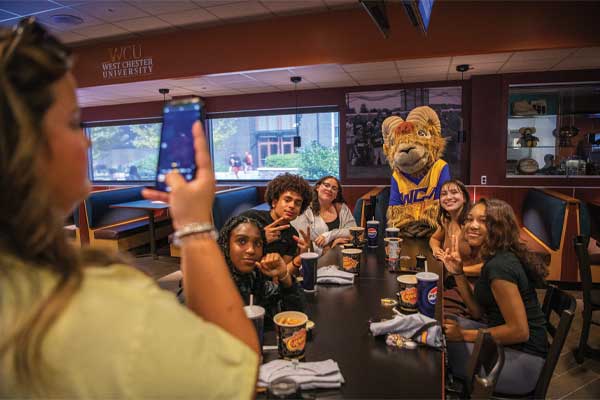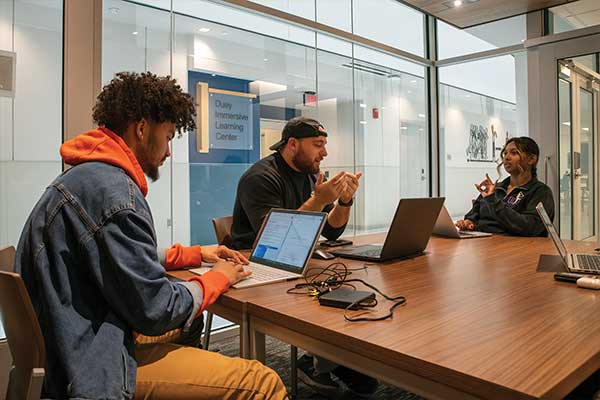
UNIVERSITY NEWS
Center for STEM Inclusion Expands Workforce Education
for Local Students in Critical Areas of National Need

WCU’s Center for STEM Inclusion supports the region’s youth in pursuing excellence in STEM fields.
Led by Professor of Physics and Engineering Dr. Brandon J. Mitchell, the WCU Center for STEM Inclusion has been designed as a dynamic outreach, research, and mentorship program that guides students successfully from elementary school to high school and then through a bachelor’s degree in science, technology, engineering, and mathematics (STEM). The program establishes a chain of mentorship between grades 3-12 students, undergraduates, and faculty/industry partners. This academic enrichment center is dedicated to empowering southeastern Pennsylvania’s K-12 children and youth with untapped potential to boldly pursue STEM fields.
The Center for STEM inclusion provides K-12 students not only access to excellent university faculty, but also access to undergraduate students who can speak to future educational opportunities.
The center has already reached more than 3,000 youth over the past three years through hands-on activities such as Super Science Saturday, Science of Learning Series, Summer Nanoscience Camp, Evening STEMersion Workshops, and Smart Rover Coding Workshops.
“The Center for STEM inclusion provides K-12 students not only access to excellent University faculty, but also access to undergraduate students who can speak to future educational opportunities,” says Dr. Jessica OShaughnessy, dean of the University’s College of the Sciences and Mathematics. “We are excited about the opportunity to work with a diverse group of students, opening the door to new ideas in STEM fields and expanding workforce opportunities in the region.”
Dedicated to breaking down systemic barriers to student success and establishing a diverse STEM workforce, the WCU Center for STEM Inclusion links experts in secondary and higher education, industry, government, and education-focused non-profit organizations directly with students from diverse backgrounds, including those from families with low socioeconomic means and historically excluded groups. These nurturing partnerships yield the vital resources and supports that students need to successfully pursue STEM careers. Currently, the center partners with more than 20 schools in southeastern PA as well as several local nonprofit organizations; more partners are encouraged to collaborate.
“Along the way, the students participating in the center’s programming clearly see every next step in their path toward a STEM career with the guidance and support needed to be successful,” says Dr. Mitchell. “In addition to possibly serving as a national model for addressing achievement gaps, our work can significantly help meet STEM employment needs, as well as work to alleviate the cost of attendance for students pursuing and completing STEM degrees who are low-income and come from groups typically underrepresented in STEM fields.”
Dr. Mitchell underscores the center’s approach with its inclusion formula: engage, motivate, expose, support, and inform the students throughout their experiences.
“In Grades 3-7, we engage students in STEM ideas and motivate them to learn more about STEM,” he explains. “In middle and high school, we expose them to modern STEM fields and practices and inform them about the modern STEM workforce, as well as what it takes to get them there.
“When students join WCU, we support them with bridge programs, tutoring, and peer mentoring. In their final years at WCU, we expose them to potential career options and inform them on how to apply for jobs with resume workshops, mock interviews, and career fairs.”
Connecting the dots at all entry points, the Center for STEM Inclusion incorporates local businesses, nonprofit organizations, and educational institutions, where they are most needed. These partners play a critical role in supporting students along their journey by helping to provide food and transportation; donating supplies and consumables such as chemicals and electrodes; providing scholarships; and lending additional administrative support.
Dr. Abbie Ganas, assistant professor of chemistry and assistant chair of the STEM outreach committee, adds, “The Center for STEM Inclusion is committed to helping all students pursue pathways that can lead to rewarding careers in growing, high-impact fields where talented professionals from all backgrounds are needed more than ever.”
Among the new programs that are expanding the center’s impact:
- STEM Outreach Ambassadors: WCU has tapped into the Federal Work Study program to develop a cohort of trained STEM undergraduate students who can lead and participate in outreach events. These ambassadors serve as mentors to the K-12 students that the center reaches out to.
- STEM Catering Service: WCU faculty and undergraduate students bring science to the students, with all equipment and supplies to perform hands-on college-level experiments to middle and high school classes.
- Strategic STEM-focused Dual Enrollment Offerings: WCU is actively working with its high school and nonprofit partners to explore dual enrollment opportunities to support students from traditionally underrepresented groups in STEM. Many high schools in lower income districts do not offer AP courses in precalculus, calculus, or statistics, which are critical gateway courses for students hoping to enter a STEM field. The goal is for the students to earn high school and college credit by taking this course from a WCU faculty member, giving them a head start as they begin their journey toward a STEM career.
More from the Fall/Winter 2024 Issue
News
iCamp
Seventh season of free summer media program
WCU Basketball Court
Honoring Coaching Legends
WCU Football Field
Named in Honor of Distinguished Alumni
Profiles
Donor:
Justamere Foundation
Alumni:
Marc McMullin ’95
Student:
Jude Bourdeau



